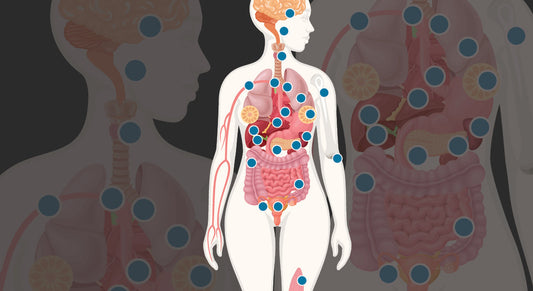The Systemic Power of Estrogen: What Every Woman Should Know

Share
Estrogen is like the quiet conductor of an entire orchestra, keeping your body working harmoniously in ways you may never have realized. When estrogen starts to fluctuate and decrease, what previously felt harmonious and stable, may now feel chaotic and erratic, unless you know how to adapt.
For generations we’ve been told estrogen is the “female hormone” — the hormone controlling periods, fertility, pregnancy and menopause. But the truth is, estrogen plays a much larger role as a biologically active hormone with receptors across nearly every major organ system in your body.
Your brain, bones, skin, blood vessels, heart, bladder, liver, colon, salivary glands, reproductive organs, and more all rely on estrogen to tell them when to grow, repair, or defend themselves.(1,2) These cells have estrogen receptors (ERs), which act like tiny welcome committees, waiting for estrogen to show up and deliver instructions.
There are two main types of estrogen receptors:
- ER-alpha: Found in high concentrations in reproductive tissues (uterus, breasts), but also in liver, and bone.
- ER-beta: More common in the brain, cardiovascular system, lungs, bladder, and immune cells.
What happens when estrogen levels drop
When estrogen is predictable, from puberty to perimenopause, receptors help maintain healthy brain function, bone density, skin elasticity and vaginal tissue resilience, to name a few. But as estrogen levels begin to decline in perimenopause and menopause, receptors get less estrogen causing cells all over the body to function differently.
In real-world terms, here’s what that might look like:
- Less estrogen in the brain may affect memory, mood, and sleep.
- Fewer activated receptors means weaker bones and slower rebuilding
- Less estrogen stimulation leads to thinning skin and reduced collagen.
- Declining estrogen leads to thinning vaginal and urinary tract tissue, as well as dryness and irritation.
Clearly, estrogen isn't just a “reproductive” hormone, it's a full-body hormone. Here’s how it keeps your body functioning optimally, from head to toe, what happens when it drops, and how you can keep your whole body thriving through menopause and beyond.
In the brain: mood, memory, and mental clarity
Estrogen is a neurotransmitter booster in your brain, supporting the production and regulation of serotonin, dopamine, and norepinephrine, which influence mood, motivation, and focus. It also helps maintain brain structure, blood flow, and synaptic plasticity, which is key for learning and memory.
What happens when estrogen drops:
- You might feel more anxious, moody, or blue
- Brain fog and forgetfulness can creep in
- Sleep disruptions become common, making mental clarity worse
Emerging research even points to estrogen’s role in neuroprotection, possibly influencing the risk of Alzheimer’s disease.(4)
In the cardiovascular system: heart health and cholesterol(5)
Estrogen helps keep blood vessels flexible and dilated, improving blood flow. It also positively influences cholesterol levels, raising HDL ("good") cholesterol and lowering LDL ("bad") cholesterol.
After menopause, when estrogen drops and the estrogen receptors on cardiovascular cells don’t get their usual supply, the risk for heart disease, already the number one killer of women, rises after menopause. Specifically, we know that:
- Arteries may stiffen, raising the risk of high blood pressure.
- LDL cholesterol may increase, while HDL may drop.
Bone strength and structure(6,7)
Bone is living tissue, constantly being broken down and rebuilt. Estrogen helps regulate this process, slowing the breakdown of bone. Without estrogen, bone loss speeds up, increasing risk of osteoporosis and weak, brittle bones, and consequently, falls and fractures.
Bone density drops 20% on average across the menopause transition. There are many ways to counteract rapid loss and support bone health, including strength training and taking calcium and vitamin D—but estrogen has a uniquely direct effect.
Skin and hair elasticity, hydration, and thickness
Estrogen stimulates collagen and oil production, keeping skin supple, hydrated, and resilient. It also affects hair growth and quality.
What happens when estrogen drops:
- Skin may feel drier and thinner.
- Wrinkles and sagging become more noticeable.
- Hair may thin or shed more easily.
Targeted skincare and nutrition can help, but hormonal shifts drive many of these visible changes.
Vaginal and bladder health(9)
Estrogen maintains the thickness, elasticity, and moisture of the vaginal walls. It also supports the urinary tract.
When estrogen drops, vaginal dryness, irritation, or burning may occur. In addition:
- Sex can become uncomfortable or even painful.
- Urinary tract infections may become more frequent.(10)
- Urinary urgency or leakage can increase, also known as overactive bladder (OAB)
Collectively, these symptoms indicate a common condition called Genitourinary Syndrome of Menopause (GSM). One effective treatment? Increasing estrogen in the region, by way of vaginal estrogen therapy.
The immune system(11,12)
Estrogen has a balancing effect on the immune response. It can be anti-inflammatory in some tissues while enhancing immune defenses in others.
But when estrogen drops during the menopause transition, it can drive a systemic inflammatory state, potentially contributing to age-related chronic disease. Inflammatory markers can rise, and some autoimmune conditions, like rheumatoid arthritis or multiple sclerosis, can flare up or get worse.(13)
Digestion and gut health
Once you find out estrogen receptors are found throughout the gut, it’s no surprise that estrogen influences important functions like how swiftly and efficiently food gets processed and nutrients get absorbed. It also helps sustain microbial diversity, which is key to a healthy microbiome,(14) and plays a role in maintaining a healthy gut lining.
What happens when estrogen drops:
- You might experience bloating, gas, or irregular bowel movements.
- IBS symptoms may worsen.
- It can increase risk of “leaky gut”—where the lining becomes permeable.
- Changes in the gut microbiome can affect everything from immunity to mood.
Probiotics and fiber-rich diets help keep the gastrointestinal system running smoothly, but estrogen loss can definitely throw it off track. Consider supplementing fiber if you are not consuming at least 25 grams of fiber each day through food sources.
Muscle mass and joint health(15)
Estrogen supports muscle maintenance and improves muscle mass and strength. It also increases the collagen in connective tissues, and improves joint lubrication. It contributes to lean body mass and can reduce post-exercise inflammation (yes, estrogen’s benefits even overlap from body system to system).
What happens when estrogen drops:
- Muscle mass naturally declines (the technical term: sarcopenia).
- Joints may feel stiffer or more prone to pain.
If you know me you know what I’m about to say: Resistance training and adequate protein are crucial as estrogen falls.
Vision and oral health(16)
Yes, even your eyesight and mouth health are kept healthy thanks to estrogen. It helps maintain moisture in the eyes and gums, and may influence tear production(17) and oral microbiome balance.
What happens when estrogen drops:
- Dry eye and blurry vision can develop.
- Gum sensitivity or bleeding may get worse.
- Potential bone loss in the jaw can lead to loose teeth.
- The risk of dry mouth and oral infections increases, thanks to reduced saliva.(18)
The Bottom Line
Estrogen does so much more than regulate your menstrual cycle. Its loss affects your brain, heart, bones, skin, gut, joints, vision, immunity, and so much more. Knowing this gives you power, the power to speak up, track symptoms, and get the care you deserve.
Whether you choose hormone therapy, vaginal estrogen, lifestyle changes, or all of the above, you have options. Talk to your doctor, share this with your sisters, your daughters, your friends. You are not alone in this. And you do not have to go through it uninformed.
You will always find straight talk and science here at The ‘Pause Life.
This article contains affiliate links.






















